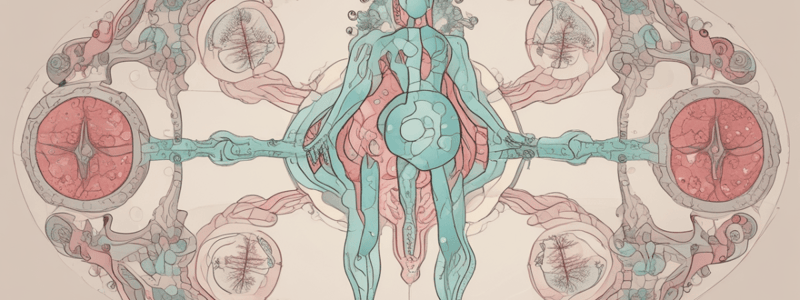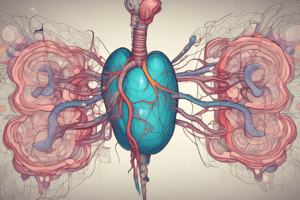Podcast
Questions and Answers
What is the primary function of hormones in the human body?
What is the primary function of hormones in the human body?
- To transmit electrical signals to the nervous system
- To influence growth, metabolism, and other physiological processes (correct)
- To regulate body temperature and blood pressure
- To produce energy for the muscles
What is the difference between intracellular hormone signaling and extracellular hormone signaling?
What is the difference between intracellular hormone signaling and extracellular hormone signaling?
- Intracellular hormone signaling involves binding of hormones to receptors on the cell surface, while extracellular hormone signaling involves binding of hormones to receptors within the cell
- Intracellular hormone signaling is slower than extracellular hormone signaling
- Intracellular hormone signaling is faster than extracellular hormone signaling
- Intracellular hormone signaling involves binding of hormones to receptors within the cell, while extracellular hormone signaling involves binding of hormones to receptors on the cell surface (correct)
What is the purpose of negative feedback mechanisms in hormone regulation?
What is the purpose of negative feedback mechanisms in hormone regulation?
- To maintain hormone levels within a normal range (correct)
- To regulate hormone production in the brain
- To decrease hormone levels in the body
- To increase hormone levels in the body
What would happen if negative feedback mechanisms fail to regulate hormone levels?
What would happen if negative feedback mechanisms fail to regulate hormone levels?
What type of disorders can occur due to hormone imbalances?
What type of disorders can occur due to hormone imbalances?
What is the role of the endocrine glands in hormone regulation?
What is the role of the endocrine glands in hormone regulation?
Which part of the pituitary gland produces oxytocin and vasopressin?
Which part of the pituitary gland produces oxytocin and vasopressin?
What is the primary function of the adrenal glands?
What is the primary function of the adrenal glands?
Which of the following hormone imbalance disorders is characterized by weakened bones due to hormonal imbalances and other factors?
Which of the following hormone imbalance disorders is characterized by weakened bones due to hormonal imbalances and other factors?
What is the primary function of the anterior pituitary gland?
What is the primary function of the anterior pituitary gland?
Which of the following hormone imbalance disorders is related to male sexual development and function?
Which of the following hormone imbalance disorders is related to male sexual development and function?
What is the role of the pituitary gland in hormone regulation?
What is the role of the pituitary gland in hormone regulation?
Flashcards are hidden until you start studying
Study Notes
Hormone Regulation
Hormone regulation is a complex process that involves the interactions between hormones, cells, and organs in the human body. Hormones are chemical messengers that are secreted by endocrine glands and sent through the bloodstream to target cells, where they influence growth, metabolism, and other physiological processes. Understanding hormone regulation is essential for maintaining health and treating hormone-related disorders.
Hormone Signaling Pathways
Hormones communicate with target cells through specific signaling pathways. These pathways involve the binding of a hormone to its receptor, which triggers a series of intracellular events leading to changes in gene expression, cell growth, or other physiological responses. Hormone signaling pathways can be classified into two main categories: (1) intracellular hormone signaling, where hormone receptors are located within the cell, and (2) extracellular hormone signaling, where hormone receptors are located on the cell surface.
Negative Feedback Mechanisms
Negative feedback mechanisms are crucial for maintaining hormone levels within a normal range. These mechanisms involve the action of hormone receptors, which can initiate a signal that suppresses the release of the hormone from the endocrine gland. This inhibition helps to prevent the hormone level from becoming too high or too low, ensuring that the body maintains a stable physiological state.
Pituitary Gland Function
The pituitary gland, also known as the hypophysis, is a small, pea-sized gland located at the base of the brain. It is responsible for secreting various hormones that regulate growth, metabolism, and reproductive functions. The pituitary gland is divided into two parts: the anterior pituitary, which secretes hormones such as growth hormone, adrenocorticotropic hormone, thyroid-stimulating hormone, follicle-stimulating hormone, and prolactin, and the posterior pituitary, which secretes oxytocin and vasopressin.
Adrenal Gland Function
The adrenal glands, located above the kidneys, are responsible for producing various hormones that help the body respond to stress, regulate metabolism, and maintain blood pressure. The adrenal glands are divided into two parts: the adrenal cortex, which produces cortisol, aldosterone, and androgens, and the adrenal medulla, which produces epinephrine and norepinephrine.
Hormone Imbalance Disorders
Hormone imbalance disorders can occur when the levels of hormones in the body are not within the normal range, leading to various health issues. Some examples of hormone imbalance disorders include:
-
Hypoglycemia: Low blood sugar levels caused by insufficient hormone production or improper regulation of glucose in the body.
-
Male Reproductive Endocrinology: Disorders affecting male sexual development and function, such as hypogonadism and erectile dysfunction.
-
Neuroendocrinology and Pituitary: Disorders affecting the pituitary gland, such as hypopituitarism, hyperpituitarism, and pituitary tumors.
-
Obesity and Appetite Regulation: Disorders affecting the regulation of appetite and energy balance, such as hyperphagia and hypophagia.
-
Pediatric Endocrinology: Disorders affecting children's hormone levels and development, such as growth disorders and precocious or delayed puberty.
-
Thyroid Conditions: Disorders affecting the thyroid gland, such as hypothyroidism and hyperthyroidism.
-
Osteoporosis: A condition characterized by weakened bones due to hormonal imbalances and other factors.
-
Hormone-related cancers: Cancers that are influenced by hormones, such as breast cancer and prostate cancer.
Conclusion
Hormone regulation is a complex process that involves the interplay of hormones, cells, and organs in the human body. Understanding the signaling pathways, negative feedback mechanisms, and the functions of the pituitary and adrenal glands is essential for maintaining health and treating hormone-related disorders. Continuing research is needed to fully understand the long-term effects of hormone modulation in growth and sexual development. The role of each hormone in parallel endocrine axes should also be more thoroughly investigated to help improve the safety and efficacy of endocrine pharmacotherapeutics.
Studying That Suits You
Use AI to generate personalized quizzes and flashcards to suit your learning preferences.




